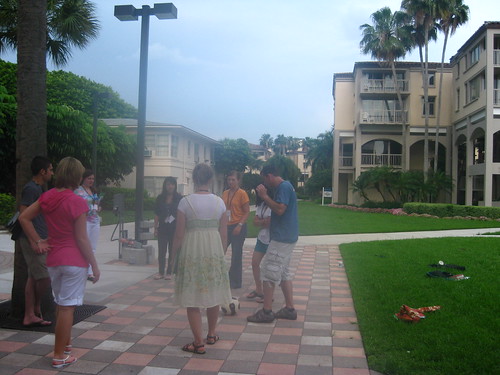An extended essay processing on fieldwork from summer 2010, started while tired and reflecting, and posted a year later.

1. The Single Eye
When I was a homeschooled and rural child, one of my favorite books was Richard Foster’s Freedom of Simplicity. Over and over, I read the yellow-paged copy, turning down the corners till they crumpled off and underlining the passages on how material possessions clutter our lives, and food our bodies, and overreading our minds and souls.
As I recall, Richard described some Greek concept of the akuo, or single, eye. He talked about the uncluttered focus on what is important. I want an akuo eye, I would think, I want a single focus. I would look out of the window, through the snowball bushes and across the corn and soybeans, and try to focus, singly, on the material and spiritual world around me. And later, a friend in college prayed over me–prophesied over me–“You will be a woman of clarity.”
But a woman of clarity I am not, and I do not have an akuo eye. I know this today, as I, an anthropologist, observe a retreat for returning short-term missionaries.
~~~~~~~~~~
2. Anthropologists and Natives
I have spent two years now observing and indwelling the strange culture of American Academic Anthropologists, through conferences and class discussions and massive amounts of obscure reading (thank you, Levi-Strauss). Through committee meetings and coffee conversations, and the infamous ‘fieldwork.’ Now I research missionaries, and so I’ve read sharp critiques of Christians and missionaries, as well as the handful of native responses by Christian anthropologists. And this summer, I observed and worked with missionaries in their native habitat.
But before that, I should note that graduate school has also been a field in itself, and I may have gone native.
I came to grad school two years ago as a conservative Evangelical, but I leave a more secular and liberal – if still committed – Christian. I still seek to see the world that my friends and family do, but I increasingly see things with double vision, fragmented, and from multiple and incompatible perspectives. I still visit my native people – midwestern American evangelicals. But I have all but joined a liberal church, and slowly found my very self converted to new way of living, one oriented around a human-centered anthropology.
And as I try to hold both my intellectual community and my native community together, to live out my duties and my love for God and man, I find myself straining farther and farther apart, mentally and socially. Wondering if I can inhabit each community truly and still be a single, an akuo, person.

3. Jealous Hopeful Eyes
This summer, I went to Central Asia to study a team of young missionaries, while also studying the local language and living with a host family. As in the rest of my life, it was hard to stand between religious and secular people, to be both ‘transparent,’ and ‘all things to all people,’ both innocent and shrewd. (I’m not a missionary–this eternal caveat–but am clearly more religious than most anthropologists are comfortable with.) And so I am a part of all groups, but fully a part of none. I am enjoying every perspective but unable to settle into a single focus, a single eye.
And so I turn my jealous eye on the dozen young men and women around me at the missionary debrief. With their newly hennaed hands and Mexican earrings, they laugh with teammates and show off new tshirts from Europe and Asia. They speak easily in the Christianese that I have always balked at, they are resilient and kind, and most of all, they seem to inhabit a sure sense of God’s purpose for themselves and every other person.
These children, they spent their summers in the Middle East, Africa, Europe, and Asia – all those areas into which we currently divide the world. And this is only a tiny subset of the thousands of short-term Christian missionaries from America, South Korea, Brazil, India, and Nigeria that cross the world every year to “reach the unreached” and “spread the good news of Jesus Christ.”
As with the team I observed, these students spent their summers teaching English, caring for children, and holding VBS lessons. They surfed and hiked and played soccer. They drank tea with villagers and coffee with urbanites, prayed and worshiped in local churches, and most of all, have stepped in to relate with others, to learn about other cultures and to communicate their own belief in Jesus. They do all this among people who are not so interested in religion, or at least a bit skeptical about this one.

And I’m a bit skeptical myself. I log into some anthropology blogs using the wireless network entitled “God Says No Facebook in Chapel,” while the others pray. This sort of double life… I’ve been living it for quite a while, holding on to diverging roads, and wondering if there is a path between them. It’s a bricollage, as anthropologists say, a piecing together. Like all the meaning we make, whether of that weird culture over there in Asia, or the self-story we rehearse endlessly in our own minds, or the story of whom and how we love–in each case, we take a bewildering reality and weave it together.
But this weaving doesn’t always work for me. So this is what I wonder:
How can a world that seems so clear from one vantage point get so muddled as soon as you introduce another? How can I inhabit these many worlds and still tell a story mixed and true?
And this is what I’m hoping – that somehow I can live among the religious people who are skeptical of secular stories, and the freethinkers who find religion distasteful, with savvy and grace for both. That somehow I can have clear eyes, less clouded by my own burning impatience and defensiveness and desire for glory and pride.
And that somehow I can do this all while listening to and telling others’ stories, and not just–eternally, infernally–my own.

Hi. I needed to look into a quote from Foster and somehow stumbled on this. I don’t usually read random blogs but yours fascinated me. Because it’s the same song that I hear in authentic Christians all around me. That the single eye opinions on homosexuality or remarriage or passing out tracts (and so on) must become questioned because it doesn’t fit. Things like King James Version were conversations of childhood that I now roll my eyes at the memories of. The journey to sort out religion from real and tradition from truth is what makes me nod and smile at this blog. I’ve not been shaken in my faith, but I admit that I’m reluctant to impose my faith on others – much less learn tactics for convincing them. It doesn’t mean it’s less true for me. It just means my belief has changed to putting the responsibility on Gods court and being willing to only be a part of His glory, not assume it’s my job to write it out for Him. Something like that. Or that I may grow into something more direct one day, but that I’m confident in my ability to see through multiple lens now. It doesn’t handicap me from stepping forward. But I make room for other people to step at different paces or different angles or different heights. Because whereas I used to think I was supposed to get into a straight line and follow accordingly I know know I don’t want to trip people. So I will move forward in faith, with freedom, and gentleness to my fellow journeymen.